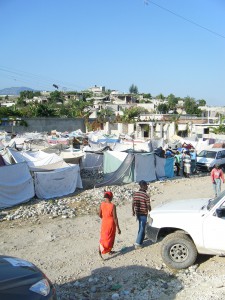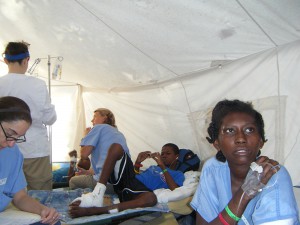Doing Good in the Worst of Times
 On Jan. 13, the day after a magnitude 7.0 earthquake hit the island nation of Haiti just 16 miles outside of its capital, Port-au-Prince, Enrico “Rico” Selga received a call from Medical Teams International (MTI), a church-based nonprofit offering medical assistance to countries in need. Selga, a nurse, has volunteered with the group for about eight years and is on their “on call” list to respond to disasters right away. Immediately, Selga began preparing to leave for three weeks in Haiti–negotiating time off from work, gathering supplies, and squaring things away before his departure.
On Jan. 13, the day after a magnitude 7.0 earthquake hit the island nation of Haiti just 16 miles outside of its capital, Port-au-Prince, Enrico “Rico” Selga received a call from Medical Teams International (MTI), a church-based nonprofit offering medical assistance to countries in need. Selga, a nurse, has volunteered with the group for about eight years and is on their “on call” list to respond to disasters right away. Immediately, Selga began preparing to leave for three weeks in Haiti–negotiating time off from work, gathering supplies, and squaring things away before his departure.
Nothing, however, could truly prepare him for the devastation he encountered when he arrived in Port-au-Prince on a United Nations plane. “You have to realize, after the earthquake 230,000 people died instantly,” he said. “But then there’s another half million homeless people, living in makeshift camps. They’re refugees inside their own country, living in tents, huts, cardboard boxes, most of them with just sheets to cover themselves. And we’re seeing 27 new camps start up a day. You can imagine the kind of chaos that brings.”
Selga is a familiar face at Clark College. After graduating from Mountain View High School in 1993, he attended Clark for two years, earning an Associate Degree in Nursing before transferring to WSU Vancouver to continue his education. With his wife, Jennifer, he owns the Coffee Lounge espresso stand in Foster Hall.
But while many Clarkers know Selga as an alumnus and a business owner, fewer know about Selga’s frequent trips–about one a year–to provide medical relief in some of the world’s most traumatized and impoverished nations. And fewer still realize what a toll his most recent trip to earthquake-stricken Haiti has taken on him and his fellow volunteers.
“I think the adjustment coming back is a lot harder than the adjustment you make going there,” he said during an interview just days after his return on March 1, pulling off his battered wire-frame glasses to rub his eyes wearily. “You always have a reverse culture shock. When you come back, everything’s hunky dory, people are walking around like nothing’s happened. And I–I just had my
soul shaken.”
 Crowded together in unsanitary conditions and without access to clean drinking water, Haitians were easy prey for every kind of disease imaginable: malaria, fevers, diarrhea, infections. Additionally, even those who survived the earthquake often sustained serious injuries, and these were now becoming infected. And with the country’s infrastructure and medical institutions decimated by the quake, people had nowhere to go for treatment.
Crowded together in unsanitary conditions and without access to clean drinking water, Haitians were easy prey for every kind of disease imaginable: malaria, fevers, diarrhea, infections. Additionally, even those who survived the earthquake often sustained serious injuries, and these were now becoming infected. And with the country’s infrastructure and medical institutions decimated by the quake, people had nowhere to go for treatment.
That’s where Selga came in. Working with a team of three other medical professionals, as well as with American and Nepalese military personnel to provide security, he set up a temporary clinic in one camp. “Instantly, you have a line of 200 to 300 people,” he says. “Even in the morning, it’s 85 degrees, totally humid, and people don’t care, they’re desperate for help.”
Selga and his teammates would work until it became too hot for them to function. Most of his colleagues got sick during their time in Haiti–either from heat stroke, dysentery, or plain exhaustion. “You get sick, and you just keep working,” Selga said. “You put yourself in a situation where people are suffering and you can help, and it becomes: Every second you don’t work, that’s people you could help, but aren’t. You forget to eat. … Of course you get dehydrated. We had to start IVs on our own teammates.”
Back home, Jennifer Selga worried for her husband’s safety, but kept upbeat as she apprised Coffee Lounge customers of his work. Many patrons had learned about Selga’s trip when, just days before he left, a note on the Coffee Lounge tip jar explained that he would be donating all tips to Hatians. “Between Tuesday and Friday, we collected $200,” Jennifer Selga said.
That wasn’t the extent of Clarkers’ support. History professor Dr. Anita Fisher, who met Selga when he was part of Model UN as a student, mentioned the Haiti trip to the History Club, whose members quickly arranged a rummage sale to raise funds for Selga to take with him. Between the sale’s proceeds and Fisher’s own personal contribution, they were able to give Selga another $140, which he then distributed to Haitians personally when he got there.
Fisher has stayed in contact with Selga over the years. “He was a serious student,” she recalls. “He always did his work, and he was always interested in other people’s cultures. He was just a natural humanitarian–you just got that sense right from the beginning.”
Jennifer Selga said that she has grown accustomed to her husband’s giving away all his possessions on these trips–which, sure enough, he did before he left Haiti. “I’ve learned to give him presents for his car,” she said. “He can’t take his car with him.”
 But Selga’s missions of mercy cost him more than just luggage. He’s taking unpaid leave, so he’s lost a month’s worth of salary. He comes home exhausted. And this time, he also lost something more precious than money or sleep: He lost a friend. One of Selga’s teammates, Issaquah nurse Matt Bouthillier, died of cardiac arrest on March 1, the day Selga flew out of Haiti.
But Selga’s missions of mercy cost him more than just luggage. He’s taking unpaid leave, so he’s lost a month’s worth of salary. He comes home exhausted. And this time, he also lost something more precious than money or sleep: He lost a friend. One of Selga’s teammates, Issaquah nurse Matt Bouthillier, died of cardiac arrest on March 1, the day Selga flew out of Haiti.
“We heard about it when we touched down in Dallas,” Selga said. “I thought they were joking. I’d spent the whole last evening there with him, talking and laughing. … He looked healthy. It just happened so fast.”
Despite this grim reminder of the perils of his volunteer work, Selga doesn’t plan to quit anytime soon. In fact, he’s planning on returning to Haiti in the summer–and Fisher is considering going with him.
“There’s nothing that’s as rewarding as helping other people,” Selga said. “You could see it in the Haitians’ eyes, the gratitude; they didn’t have to say a word. They’re very gracious people, very kind and hospitable.”
Selga offered one last note of caution to people who might be tempted to forget about Haiti’s plight as it fades from the top of the news headlines. “This is the calm before the storm,” he warned. “The rainy season is coming, and people still don’t have shelter. You’re going to see a lot of people die.”
And somewhere in a tent, or a half-demolished church-turned-clinic, or a makeshift shelter in the middle of a refugee camp, Selga will be there, trying to stem the tide.
The photos accompanying this article were taken by Enrico Selga during his trip to Haiti. For those who would like to donate to Haiti relief efforts, Selga suggests choosing a “good charity that fits their values.” A good first step is to visit a site like Charity Navigator that rates charities’ effectiveness.